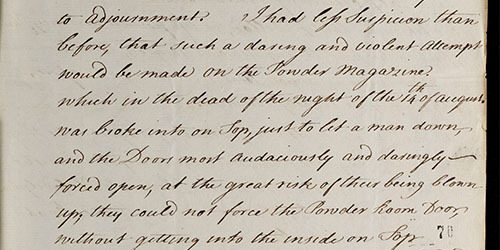Gunpowder, treason and plot: Bermuda and the American Revolution
“The Powder magazine, which in the dead of night of the 14th August was broke into […] the doors most audaciously and daringly forced open, at the great risk of their being blown up”.
So wrote George James Bruere on the 17th of August 1775 in his role as the Governor of Bermuda at the height of the American War of Independence.
That April, after the Battle of Lexington, the Continental Congress – the legislative body which operated as the first national government of the United States between 1774-1781 – announced a trade embargo against British colonies which remained affiliated with the Crown.
This ban threatened the people of Bermuda with poverty, famine, and civil unrest. Having abandoned agriculture after the dissolution of the Somers Isles Company in 1684, Bermuda relied heavily on its maritime economy and particularly its salt trade. The Tuckers, who had been prominent in the colony’s political and economic landscape since the appointment of Captain Daniel Tucker as Governor in 1616, met with eight other members of the Bermudian parishes and sent Colonel Henry Tucker as a delegate to the rebel Congress.
Salt was offered to the revolutionaries, and summarily rejected; Henry Tucker, meanwhile, had noted a clause in the ban which specified that military supplies might be exchanged for the American goods that Bermuda so desperately needed to continue its trade. Tucker liaised with Benjamin Franklin to confirm this loophole whilst he attended the Congress at Philadelphia, even as a letter rumoured to have been written by George Washington – perhaps unaware of the communications between Franklin and Tucker – was circulated amongst the Bermudians to beg them to take advantage of the “very large Magazine in your Island under a very feeble guard.”
On the night of the 14th of August, the Powder Magazine in Bermuda’s capital of St George’s was raided, and one hundred barrels of gunpowder were stolen. The barrels were smuggled out to waiting boats and, according to Governor Bruere’s letter, those vessels suspected of containing the gunpowder were “seen under sail, the same day, at such a distance off that the Custom House Boat could not overtake either”.

Figure 1 Excerpt from Governor Bruere's letter in CO 37/36. Images including crown copyright images reproduced by courtesy of The National Archives, London, England. www.nationalarchives.gov.uk.
Bruere, whose son John had been killed in the Battle of Bunker Hill in June fighting the revolutionaries, was incandescent with rage. Labelling it an “audacious piece of villainy” and confident that it must have been executed by a large group of people including “white persons of consequence”, Bruere and the legislative body of Bermuda gathered on the 16th of August and immediately agreed to offer £100 sterling as a reward for any discovery or legal conviction made against the perpetrators. Bruere offered a further £30 “out of my own purse”.
The treason was more than just political in its potential repercussions. Colonel Henry Tucker’s son, also named Henry Tucker, was the President of the Governor’s Council in Bermuda, and married to George Bruere’s daughter Frances. Two of Colonel Henry Tucker’s other sons, St. George Tucker and Thomas Tudor Tucker, had emigrated before the revolution began, and both fought on the side of the rebels – Thomas Tucker went on to become the longest-serving Treasurer of the United States, also serving as a US Congressman and Senator.
On the 2nd of October, Bermuda was exempted from the trade ban by the Continental Congress, and despite another prohibitionary ban – this time issued by the British parliament against trade with the American revolutionaries – and a military presence intended to deter smuggling, illegal wartime trade on Bermuda continued unabated.
Bermuda was to face starvation and famine more than once in the following years of the war. George Bruere died in 1780, reportedly of stress-related health complications, and his son took over as Governor of Bermuda: George Jnr.’s crackdown on smuggling was so severe that even the Tucker family were eventually unable to continue their trade with the United States.
Despite the multiple rewards issued, no one was ever prosecuted for the gunpowder theft.
For more information about Colonial Caribbean, including pricing, please request a demo.
Recent posts

Discover how the Mass Observation Project evolved through the 2010s. Explore societal trends, from climate change to digital shifts, revealed through module IV. Read how researchers and the public document everyday life in a changing world.

This blog spotlights Foreign Office, Consulate and Legation Files, China: Section II's material which documents China's relations with Britain, and key events such as the beginning of the Xinhai Revolution that ended centuries of imperial rule. It features correspondence between London and British diplomats stationed in Weihaiwei, the first foreign concession in China.
